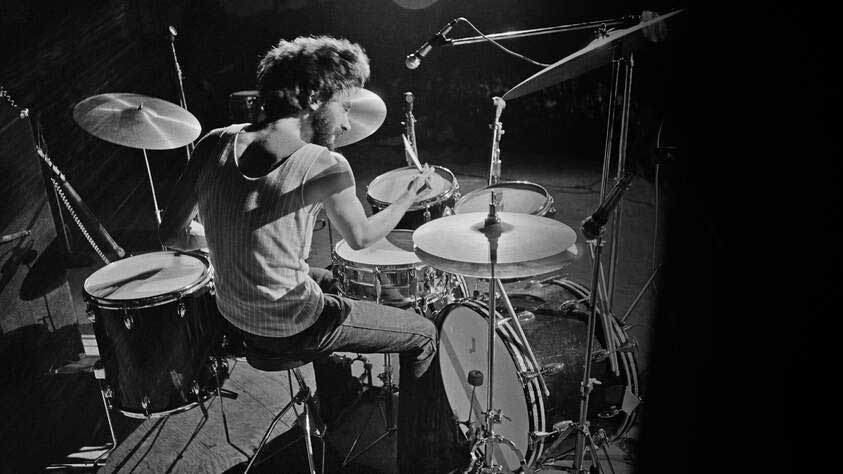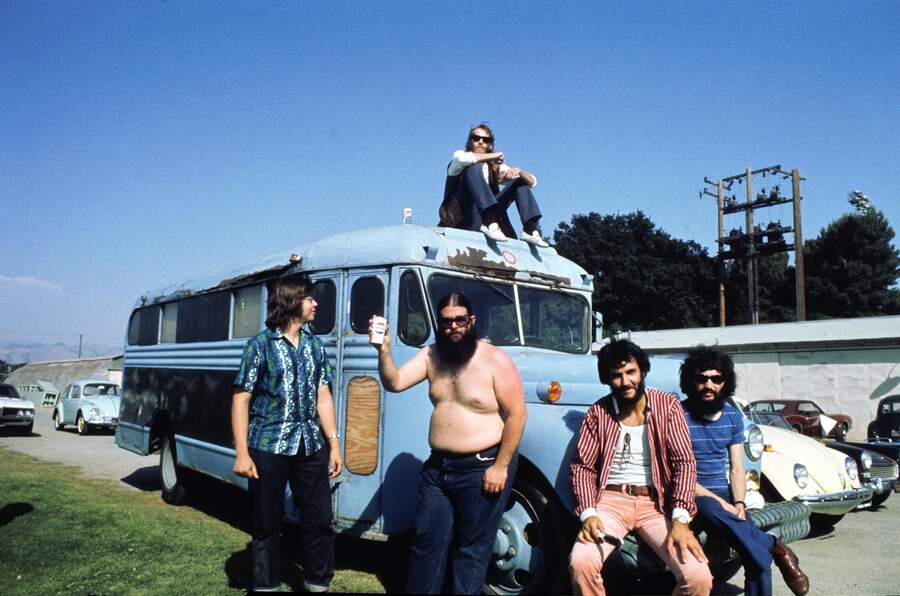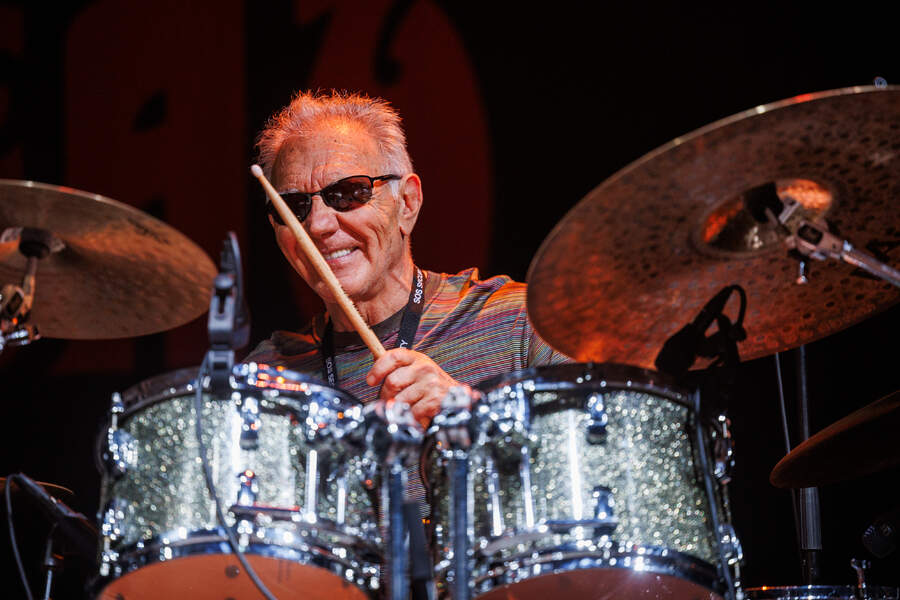
There’s a certain kind of drummer personality type that you find in a lot of classic rock bands. Think Charlie Watts, Ringo Starr, John Densmore. The steady, even-keeled timekeeper. The quiet, sensible one, observing the wild excess and eccentricity of his bandmates from a vantage point at the back of the stage.
“Maybe it’s the aerobic exercise that makes us a little more stable,” Fito de la Parra says with a laugh. Fito, 77, is the original drummer - and only surviving member - of veteran blues-rock group Canned Heat. “Of all the instruments, drums is the most physically demanding. You can play another instrument and be totally relaxed. But with drums you’re putting your whole body into play - arms, legs, back, feet. And you’re using your brain too. So maybe that’s part of the reason why we’re known to be a little bit more steady than the rest of the musicians.”
Born Adolfo de la Parra in Mexico City in 1946, he grew up in a music-loving family, and gravitated to the drums when he was 12 years old. “I chose the drums because I didn’t really want to deal with the public in the front,” he says. “I always enjoyed being in the background more. You feel protected, surrounded by the other guys.”
When he was 16, Fito went with his dad to see a Bill Haley & The Comets concert in Mexico City. It was a life-changing moment for the aspiring musician. “It was this new music and attitude that came from the north – the first live rock’n’roll band in our lives. And we took it with so much love and respect.”
That led to drumming in two successive bands, Los Hooligans and Los Sinners, doing Spanish-language covers of American rock’n’roll by Elvis and Little Richard.
In the early 60s, Los Sinners crossed the border to play clubs in Los Angeles, including The Troubadour and The Daisy, a Beverly Hills celebrity hangout. “We were all underage,” Fito recalls. “And we didn’t have working permits, only tourist visas. So eventually we got caught by the border patrol and were invited to go back!”
But Fito met and married an American girl, and in 1966 moved to Los Angeles permanently, where he befriended drummer Frank Cook, who was playing with a newly formed band called Canned Heat (the name comes from a 1928 blues song by Tommy Johnson that uses the jellied heating fuel as a metaphor for sex). Leading the group were two blues purists, Alan Wilson and Bob Hite, who dug deep into their record collections to resurrect obscure classics. When Cook’s jazzier drumming style wasn’t working out, Fito was invited to audition. On the way to meeting the band for the first time, he stopped at a record store.
“I bought a Junior Wells record, a Chicago blues record. So I had that under my arm when I knocked on the door. I didn’t know these guys were absolute musicologists. They had rooms full of old 78s and LPs. Bob Hite told me months later: ‘When I opened that door, and I saw you with that Junior Wells record under your arm, I knew that you were a good drummer already.’”
There began a relationship built on shared passion for the blues. “Most musicians, when they offer you a gig, the first thing you ask is: “How much am I gonna make?’” says Fito. “I didn’t do that with Canned Heat. Because I knew they were not making any money. It was just a blues band. We’re playing in small clubs. But we had that feeling and they had the presence. So that’s why I say I was born to play with Canned Heat.”

With other blues bands such as John Mayall’s Bluesbreakers and the Paul Butterfield Blues Band flourishing in the late 60s/early 70s, Canned Heat staked out their own unique territory. “The difference is that we wanted to play country blues,” Fito says. “Those other bands were mainly dedicating themselves to the Chicago blues style. We wanted to go back further - Blind Lemon Jefferson, Charlie Patton, Robert Johnson and people like that. We wanted to put country blues at the service of rock’n’roll.”
Band leaders Hite and Wilson were a study in opposites (“I called them Laurel and Hardy,” Fito says). The burly, bearded Hite – nicknamed ‘The Bear’ - was gregarious, the life of the party, with a growling voice that powered tracks like Refried Boogie and Let’s Work Together. “Bob’s mission in life was to play records, have a good time, smoke pot and share the blues with other people,” Fito says. Wilson, nicknamed ‘Blind Owl’, was introverted, intense, with that soft, haunted voice you hear on such classics as Going Up The Country and On The Road Again.
“The first time I saw the band,” Fito recalls, “there was Bob, a big guy with a beard, and guitarist Henry Vestine, moving around like a sunflower, and a bass player Larry ‘The Mole’ Taylor, shaking and moving the way he did. And then there’s Alan, who looks like a kid in science class, just standing there. I thought: ‘Why is this nerd-looking guy in the band?”
Fito would learn quickly that behind that deceptive front, Wilson was a badass slide guitar player, “perfection on the harmonica and an all-around musical genius”.
Where that combination of disparate personalities excelled the most was on stage. The Heat’s prowess and fluid interplay as a live band has been an influence on countless contemporary acts, from Gov’t Mule to Tedeschi Trucks Band. So were the many studio albums Canned Heat made a necessary evil?
“We always liked to have fun when we’re recording,” says Fito. “And we don’t like to hammer a song over and over again, looking for a certain perfection that does not exist. We’d rather just play one or two takes and keep the freshness. That’s how we approached most of our records, and still do. Then the songs evolve on stage.”
The copyrights for a lot of the Heat’s early recordings would be worth millions today, had it not been for what Fito calls the “infamous Denver drug bust of 1967.” An undercover policeman, an old friend of Hite’s, infiltrated the band, busted them for pot possession and threw them all in jail.
To raise the $10,000 bail to get them out, band manager Skip Taylor traded their publishing to Liberty Records. So despite all the many times songs like Going Up The Country have appeared in films and high-profile commercials, for the likes of McDonald’s and Pepsi, “we don’t make any money from it”, Fito says, with a sigh. “But at least all that exposure has helped us attract a younger audience.”
As well playing at iconic venues around the world like Madison Square Garden, the Royal Albert Hall and Olympia, Canned Heat performed at two of the biggest festivals of the 60s: Monterey and Woodstock. “With Woodstock, I didn’t even want to play it,” Fito says with a smile. “The band had just gone through our first tragic event, when Henry Vestine quit. Harvey Mandel came in. We hadn’t even rehearsed with him before we played Woodstock. But our manager said: ‘This is going to be the biggest gig you’ve ever played!’ I thought: ‘Right, sure.’ But of course it was a very unique thing, that I don’t think can ever be repeated, though they’ve tried.”
The tragic events that Fito refers to were the untimely drug overdose deaths of Wilson, aged 27, and Hite, 38, in 1970 and ’81, respectively.
“I wish we had been more aware of their problems,” Fito says. “We were young and were ignorant about it. We were enthusiastic about our success and this great adventure we were living in. Alan had serious problems with depression. He might have had some chemical imbalance. But it was very tragic.
“Bob had collapsed many times before from drugs, on stage and off, so we were almost used to it. The next morning, he’d say: ‘What the fuck happened?’ We’d say: ‘Man, you got wasted again.’ But after a show at the Palomino, a fan approached him with some heroin and Bob snorted the whole vial. He passed out and they weren’t able to revive him.”
Against the odds, Canned Heat have endured, with some 45 members passing through the lineup. “Whoever comes in, they have to understand what Alan and Bob were all about,” says Fito, “and what the band is about. That is very important musically. It’s also important for them to be decent human beings. That’s where the problem comes sometimes, because some of the best players are sometimes the most arrogant and difficult to live with.”

In 2024, Canned Heat have toured the US and Europe, playing both clubs and festivals. “The baby boomers and bikers are probably eighty per cent of our audience,” Fito says, “but we’re seeing more and more young people, who are curious. You know, for a twenty-year-old to come to a Canned Heat show is an act of rebelliousness [laughs]. Because they’re coming to see a kind of music that is no longer around in their world. So they see this bunch of hippies, who play long solos and blues, with lots of improvisation, and it’s wonderful.”
Thinking of Fito’s description of the aerobics of drumming, we wonder if it’s challenging to do it at his age?
“I’m starting to have some problems with my legs – spasms and things,” he admits. “But I’m doing everything I can to avoid bigger problems by staying active, taking medications. But I’m about to turn seventy-eight years old. I mean, I shouldn’t be playing, right? But I am and I still love it. When I’m playing I don’t feel any pain. We have a lot of gigs coming up, and I hope I make it okay. At this age, you never know, I could just drop dead on the stage.”
He pauses, then adds with a laugh, “But one thing I always say is: ‘Musicians don’t retire. Musicians just die.’”
Canned Heat’s Final Vinyl is out now via Ruf.







